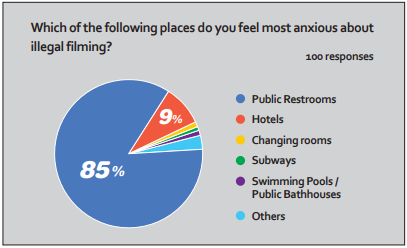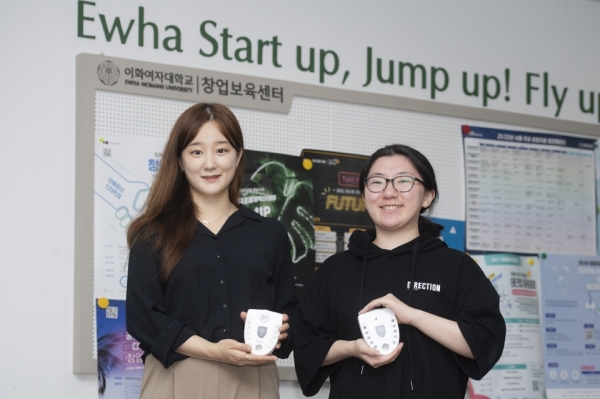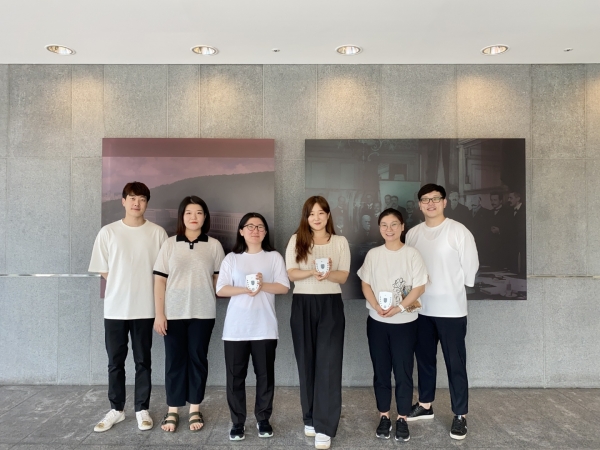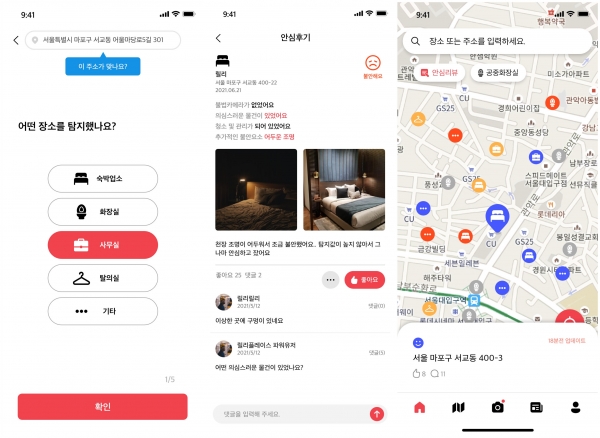As technology develops, so too have the crimes taking advantage of it. In South Korea, the usage of illegal hidden cameras – also known as spycams – is the dominant form of digital sex crimes. Solutions such as toughening regulations and punishments were put in place to stop predatory behavior. However, according to the Korean National Police Agency, digital sex crime increased over five years by 35 percent.
For women in South Korea, spycam footage is tantamount to what they call a “social death penalty,” as the footage is not just offensive but exploited as a form of blackmail. Digital sex crime offenders commonly use illegal devices to film numerous women – who are most of the time unspecified – without consent in public and private places such as restrooms, change rooms, hotels, and while walking up subway station steps.

To understand spycams and their impact on women in South Korea, Ewha Voice conducted a survey on 100 students at Ewha Womans University. The vast majority of survey respondents – 97 percent – said they experience anxiety in daily life due to illegal filming. Only two respondents mentioned not feeling anxious.
In regards to public places, 85 percent of survey respondents stated that they feel most anxious about illegal filming in public restrooms, followed by hotels and subways, respectively. Over half of the women surveyed said they have skipped using public bathroom facilities due to their concerns about illegal filming.
While not representative of the entire country, the results indicate the psychological impact on young women in South Korea. In fact, according to the Korean Women’s Development Institute, 23 percent of victims of illegal filming and other sex crimes considered suicide.
While alarming, the digital sex crime epidemic is proving difficult to resolve. The perpetrators of such acts – at least those caught – are often given lenient sentences by a legal system that does not give the issue much credence.
“The sentencing of illegal filming cases is too lenient. It is because there are just too many cases. Because it is so prevalent the courts do not take it seriously. And the male judges do not take it seriously because men do not experience it,” South Korean Lawyer Ahn Seo- Yeon said to the BBC regarding spycam footage.
The situation has, however, led to some positive tech-focused developments aimed at assisting women in South Korea. Han Soo- Yeon, the CEO of Uniuni, and Son Dong-Hyun, the developer of Relief’s Map, are each developing their systems to combat digital sex crimes in South Korea.
Uniuni to eradicate illegal camera installment in public restrooms


Founded in 2020, by Ewha Womans University junior Han Soo-Yeon, Uniuni aims to eradicate spycam footage in public restrooms using a system they call Savvy. Savvy detects spycam perpetrators’ movements while they are installing a camera. The system works based on a deep- learning model that detects the absolute depth data of people’s movements. Absolute depth data is a type of data that cannot be identified, so it catches suspiciousactions without invading privacy of any sort. Also, once such action is detected, the device’s built-in alarm goes off and directly reports it to the police.
“Restrooms are supposed to be safe no matter what,” Han said. “It should not be a matter of choice where you can or cannot go. Also, it is not a place where some people go and some people do not. Everyone must go to the bathroom several times a day. Not being able to feel at ease when visiting a place like this is wrong.”
In her own experience, Han herself felt anxious about using or even going inside public restroom stalls. In the beginning, her response was simple caution. However, soon after looking deeper into the spycam epidemic, she grew both disgusted and uncomfortable.
“I found out that illegal filming offenders created online cafes where they would share information regarding the crime,” Han said. “They shared ways to minimize sentences in case they got caught – even lawyers got involved to inform them on such tactics. The saddest part is that most victims are not even aware that this is happening to them. And nearly half of the few that find out feel suicidal.”
Han realized soon after that this was not a problem reserved for herself but a problem that applies to all women. But what bothered her was the solutions proposed and conducted at that time seemed to her to be ineffective.
Women that were victims of such public restroom spycam crimes were only able to take actions such as pressing an emergency button in a threatening situation. Han felt as though this was a reactive measure for an inevitable crime. Her solution – rather than being reactive – strived for prevention with Han putting her major in computer science and engineering to work and coming up with Savvy and her company Uniuni.
“But also, we need safe restroom validation systems so that public restrooms are frequently checked upon. Building owners should take responsibility to keep public restrooms in their buildings crime- free,” Han said.
An institutional framework is what she thinks will encourage building owners to take part in preventing these crimes.
Even so, Han still believes that there should be more fundamental precautions made outside of technological boundaries. This is where she thinks that institutions such as the legal and educational systems need to play larger roles. Often, according to Han, charged spycam perpetrators cite that it was their first time or that they did it out of curiosity and get off with light sentencing. She said that the lax legal sentencing is an affront to the psychological damage women go through after becoming victims of such digital sex crimes.
“Zero tolerance should be applied on the crime and revealing the offenders for life, along with increasing penalties by 20 years,” Han said.
Furthermore, the education system in South Korea regarding education on sexuality is lagging behind, according to Han, who says that a more active approach to sexuality would provide benefits. Her reasoning behind this is due to the fact that the spycam epidemic reaches even middle schools and high schools.
Cracking down illegal hidden cameras in Korea: Relief’s Map

While different to Uniuni’s Savvy, Relief’s Map is also based on new technology developed by the South Korean company sPresto. Relief’s Map uses artificial intelligence (AI) to show women safe places free from spycam risks and works with the Seoul Mapo District police. sPresto’s CEO, Son Dong-Hyun said that Relief’s Maps’ purpose is to create the value of relaxation for women through technological innovation.
Son, like Han, was initially shocked that so many South Korean women were afraid of illegal filming in public and that no innovative solutions were dealing with the crime – despite the severity. He soon found out there was also a lack of options for women to help protect themselves – Relief’s Map was created out of this societal need and was Son’s way of combating digital sex crimes.
Relief’s Map, however, was not Son’s first contribution toward the goal of cracking down on digital sex crimes. Before the birth of Relief’s Map, Son has been awarded Issue Maker’s 2018 “Figure of Korea Award” in the category of “Social Value Realization Enterprise”. The award was for sPresto's development, “Right to be Forgotten”, regarding the solution to detect and remove illegally leaked footage and images of women, replacing the digital undertakers. sPresto developed their technology to enable victims of digital sex crimes to find their leaked images and video footage and demand the removal of such media.

However, Son concluded that there is no better post-incident solution than one that prevents the crimes. Subsequently, sPresto now focuses on Relief’s Map, which can prevent digital sex crimes and spycam footage crimes in advance.
The development of Relief’s Map used deep learning-based small object detection technology that finds small camera lenses hidden in public spaces, such as public restrooms and hotel rooms.
“In order for the app to learn the technique, a lot of related data was required. We gathered data through actual purchases of many small cameras and images of cameras that the users have found using the app and uploaded on to the app as well, ” Son said.
Son said that the AI model of the app lets the users know if there is a similarity – no matter the size – between the suspected spot and a hidden camera lens identified by the app so that it does not miss any hidden cameras. This somewhat foolproofs the system as camera lenses used for digital sex crimes come in various shapes and sizes.
While sPresto’s app boasts the highest accuracy among the existing illegal camera detector apps in South Korea – with many women already finding illegal cameras using the app inside and outside of South Korea – Son’s largest concern rests on some users doubting the abilities of the app. Occasionally, the app detects spots showing similarities to camera lenses but are not actually cameras – just similarly shaped.
“To solve this problem, we set the detector’s sensitivity to be adjusted by the users. Users can set the sensitivity to the highest to find as many hidden cameras as possible and to the lowest if they would like to check only spots with the high similarity,” Son said. “Furthermore, we are currently working on the improvement of UI and UX so that the users can follow the exact guidelines provided because if they are not followed properly it can hinder the app’s accuracy.”
Since sPresto launched their Relief’s Map, its users have been sending words of support and thanks – something that Son says makes him and his team feel very thankful that their app is actively helping women across South Korea.
“The app topping the charts on app stores does make us happy,” Son said. “Yet, what makes us the proudest is when we receive emails from the users saying that our work is a great help to many individuals, and when our friends and families recommended the app to us without knowing that we have developed the app.”
In furthering their mission to create a more safe environment for women, sPresto is working on another project with large ambitions to prevent spycam crimes from occurring in the first place.
“We are currently working on a project providing a safe, relaxed accommodation booking service, called Relief’s Stay,” Son said. “It would be a completely different service than any other service that we have previously worked on, focusing on safe accommodation reservation services. We are planning to first release the app between December and January next year.”
Son said sPresto would continue to support women if they encounter any illegal hidden cameras in public places and highlighted how common the problem is in South Korea.
“I have seen the actual cameras that are used for illegal filming – from USB chargers to lighters –with my own eyes and thought to myself that it would be so hard to find these cameras and avoid being filmed if we only look with our eyes,” Son said. “It would be no problem if there were no criminals taking advantage of these cameras, but the reality is that this issue of illegal filming happens closer than we think it does. Nevertheless, we will be sure to support you if you find any cameras in public places.”

